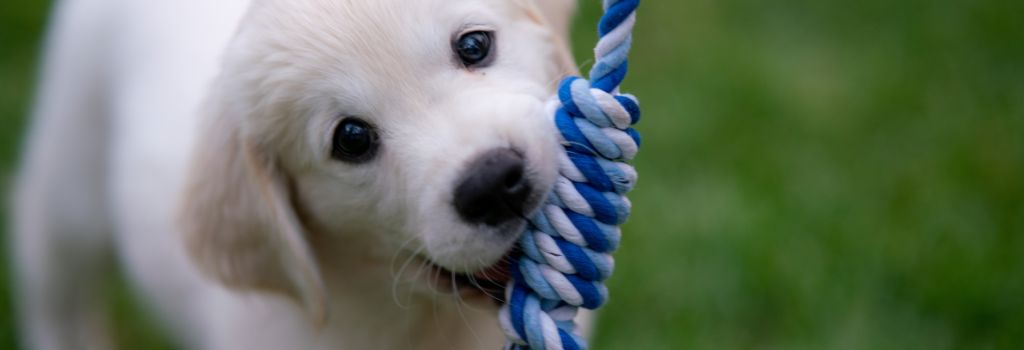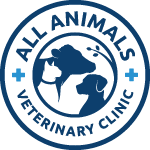The excitement of bringing home a new puppy is unmatched. Those tiny paws, playful antics, and tiny tail can melt even the toughest hearts! However, beneath the adorable exterior lies a significant responsibility that extends far beyond cuddles and playtime. Proper preparation and a solid commitment to your puppy’s well-being from day one are crucial for raising a healthy, happy, and well-adjusted adult dog. Keep reading to learn how to prepare to be a responsible puppy parent!
Before Your Puppy Arrives
Responsible puppy ownership begins well before your furry friend comes home. Start by thoroughly puppy-proofing your living space. This process involves securing loose wires, removing toxic plants, and storing chemicals out of reach. Consider your home from a puppy’s perspective. What might look like a tempting chew toy could be a potential hazard.

Next, gather all the essential puppy supplies. Your shopping list should include:
- A comfortable crate or bed
- Appropriate-sized food and water bowls
- High-quality puppy food
- Collar with identification tags
- Leash for walks and training
- Puppy-safe toys for entertainment and teething
- Cleaning supplies for inevitable accidents
Choosing a veterinarian should be at the top of your priority list. Research local clinics, read reviews, and, if possible, schedule a visit before bringing your puppy home.
As veterinarians, we cannot overstress the importance of early and consistent healthcare for your new companion. A comprehensive vaccination schedule protects your young dog from preventable diseases. Your chosen veterinarian will create a personalized plan based on your puppy’s age, breed, and lifestyle factors. These plans typically include core vaccines like distemper, parvovirus, and rabies, as well as non-core vaccines that may be recommended based on your location and puppy’s potential exposure risks.
Health and Wellness
Equally important to vaccinations is parasite prevention. Regular deworming protects your puppy from internal parasites that can cause health issues and, in some cases, be transmitted to humans. Flea and tick prevention is also crucial, as well.
Consider investing in pet insurance. While it’s an additional expense, having coverage provides peace of mind and financial protection in case of unexpected illnesses or injuries. Many plans cover accidents, diseases, and even routine care, which is especially beneficial during the puppy stage when veterinary visits are frequent.
Discuss spaying or neutering your puppy with your veterinarian. These procedures offer health benefits, such as reducing the risk of certain cancers, and they help control the pet population. Your vet will advise you on the best timing for the procedure based on your puppy’s breed and individual health factors.
Nutrition
Proper nutrition lays the foundation for your puppy’s growth and development. Choose a high-quality puppy food appropriate for your dog’s breed. Large-breed puppies, for example, benefit from specially formulated food that supports their rapid growth while minimizing the risk of orthopedic issues.
Establish a consistent feeding schedule. Young puppies typically eat three to four meals a day before gradually transitioning to two meals as they mature. Be careful with portion sizes to prevent obesity. While your pup’s eyes may plead for more, stick to the recommended serving sizes.
Treats play an important role in training, but use them judiciously. They should make up no more than 10% of your puppy’s daily caloric intake. Choose healthy, puppy-appropriate treats and use them strategically during training sessions.
Get familiar with foods that are toxic to dogs, like chocolate, grapes, onions, and xylitol (a sweetener found in many sugar-free products). Keep these items out of reach and educate family members about the dangers they pose to your puppy.
Training and Socialization
Begin training and socialization as soon as your pup comes home. Positive reinforcement techniques work wonders when teaching basic obedience commands and house training. Reward-based methods effectively shape desired behaviors and strengthen the bond between you and your puppy.
House training requires patience and consistency. Establish a routine, praise successes lavishly, and never punish accidents. Remember, your puppy is learning and needs your guidance and understanding.
Expose your pup to different people, animals, situations, and places during the critical socialization period (between 3 and 16 weeks of age). This exposure helps them develop into a well-adjusted adult dog who is comfortable in different situations and less likely to develop fear-based behaviors.
Address behavioral issues promptly and consistently to prevent them from becoming ingrained habits. If you’re struggling with a particular behavior, seek help from a dog trainer or behaviorist.

Exercise and Mental Stimulation
Exercise is vital for your puppy’s physical and mental well-being, but it’s essential to tailor activities to their age and breed. Short, frequent play sessions are ideal for young puppies. As they grow, increase exercise duration and intensity.
Provide toys and puzzle feeders to keep your puppy mentally stimulated. Mental exercise is as important as physical activity in preventing boredom-related behavioral issues. Rotate toys regularly to maintain interest and prevent destructive chewing behaviors.
Grooming and Hygiene
Establish a grooming routine early to accustom your puppy to handling. Regular brushing keeps their coat healthy and provides a chance to check for skin issues or abnormalities. Introduce nail trimming gradually, making it a positive experience with plenty of treats and praise.
While often overlooked, dental health is crucial to your puppy’s well-being. Start brushing their teeth early using puppy-safe toothpaste. When established young, this habit can prevent dental issues later in life.
Building a Strong Bond
Building a strong relationship with your puppy takes time, patience, and consistency. Set clear rules and expectations from the start, and ensure all family members are on the same page. Consistency in training and household rules prevents confusion and helps your puppy understand what you expect of them.
Include your puppy in family activities when appropriate, but also teach them to be comfortable with alone time to prevent separation anxiety. Gradually increase the duration of alone time, providing safe toys or puzzles to keep them occupied.
Closing Thoughts
As veterinarians, we see the profound impact of responsible ownership on a dog’s health and happiness. From providing proper nutrition and healthcare to offering love and guidance, every aspect of puppy care contributes to raising a well-adjusted adult dog. The effort you invest in these early months will pay dividends in the form of a loyal, healthy companion for years to come.
Remember, your veterinary team is here to support you every step of the way. Schedule an appointment with your veterinarian today to ensure your new canine companion gets the best possible start in life. Together, we can help your new furry family member grow into a happy, healthy adult dog and create a lifetime of cherished memories along the way.
Don't have a vet in your area yet? We can help you find a local veterinarian.
If you have more questions, the GeniusVets Teletriage platform will give you unlimited access to text and/or video calls with board-certified veterinarians! To learn more click here.
